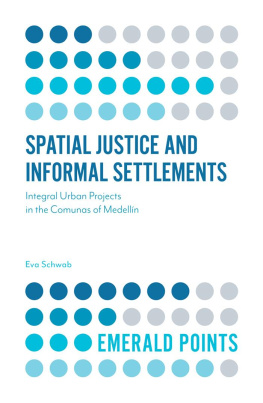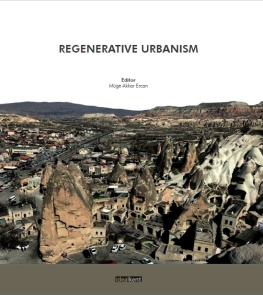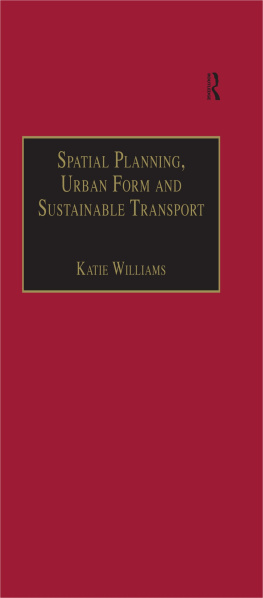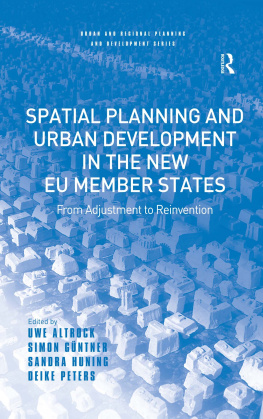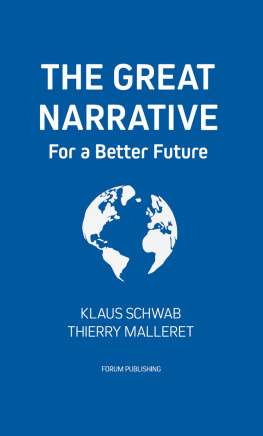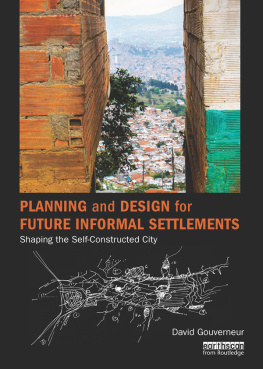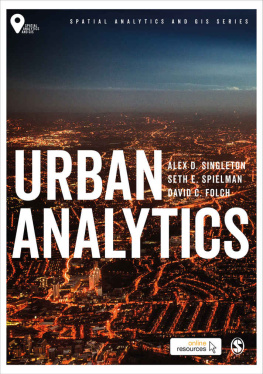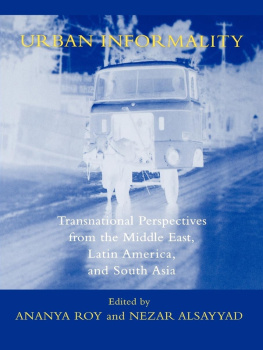SPATIAL JUSTICE AND INFORMAL SETTLEMENTS
Integral Urban Projects in the Comunas of Medelln
SPATIAL JUSTICE AND INFORMAL SETTLEMENTS
Integral Urban Projects in the Comunas of Medelln
BY
EVA SCHWAB
Institute of Landscape Architecture, University of Natural Resources and Life Sciences, Vienna, Austria
United Kingdom North America Japan
India Malaysia China
Emerald Publishing Limited
Howard House, Wagon Lane, Bingley BD16 1WA, UK
First edition 2018
Copyright 2018 Emerald Publishing Limited
Reprints and permissions service
Contact:
No part of this book may be reproduced, stored in a retrieval system, transmitted in any form or by any means electronic, mechanical, photocopying, recording or otherwise without either the prior written permission of the publisher or a licence permitting restricted copying issued in the UK by The Copyright Licensing Agency and in the USA by The Copyright Clearance Center. Any opinions expressed in the chapters are those of the authors. Whilst Emerald makes every effort to ensure the quality and accuracy of its content, Emerald makes no representation implied or otherwise, as to the chapters suitability and application and disclaims any warranties, express or implied, to their use.
British Library Cataloguing in Publication Data
A catalogue record for this book is available from the British Library
ISBN: 978-1-78714-768-3 (Print)
ISBN: 978-1-78714-767-6 (Online)
ISBN: 978-1-78743-017-4 (Epub)
CONTENTS
Acknowledgements
List of Abbreviations
About the Author
ACKNOWLEDGEMENTS
Over the past few years, many people have shown support, understanding and encouragement for me and my work in numerous ways some more visibly, others indirectly. Now is a good time to appreciate their contributions and put my gratitude on paper.
First and foremost, I want to express my deepest thanks and appreciation to the residents of Comuna 13 in Medelln. Without their help, this research would not have been possible. Their humanity, their perseverance in times of hardship, their openness and warmth have offered inspirational lessons beyond the scope of this work. I hope my work can contribute to a better understanding of their living environments and in that sense contribute to improve their living conditions.
I also wish to thank the other people in Medelln who have supported my fieldwork there, be it professionally or personally. The staff of EDU and PUI have been very open towards my project and incredibly helpful in providing information and contacts. Without them I could not have started my explorations. I especially want to thank Carlos Andres Escobar, Team Leader of the PUI architects, and Natalia Serra and her team of sociologists, for their constant support.
The inspiring acquaintances and wonderful friends I have made during my time in Medelln dissuaded the plan I had when coming to Medelln: to spend long evenings alone catching up on the reading I have always wanted to do but never found time for. Our conversations, excursions and nights out, our drinks in the park and innumerable cafecitos were a wonderful contrast to a tight working schedule, and also helped me to understand Medelln, its history, politics and social dynamics better. Gloria Aponte, from the Universidad Pontificia Bolivariana, deserves special thanks for her openness, support and willingness to share her manifold resources with me.
Thank you, Erika, Gloria, Liliana, Nina, Greg, Carlos, Carlos Andres and Camilo for the very special time we had together and for making the city a home.
For their advice, clarity and important suggestions for improving my work I want to thank especially Lilli Lika and Helen Armstrong. I am also grateful to my colleagues at BOKU and TU Wien for inspiring conversations that provided valuable feedback as well as moral support.
Moreover, I wish to thank the editors at Emerald, Jen McCall, Rachel Ward and Kim Chadwick, who smoothly guided me through the entire publication process.
Among all the people who supported this project, my greatest debt is owed to my partner Philipp for his unfailing support from the very beginning of this project, be it through encouragement, critical questions or time off from parental duties. I deeply admire his ability to engage with complex methodological questions at 6 oclock in the morning, before breakfast. He provided the day to day emotional sustenance necessary to complete this journey.
LIST OF ABBREVIATIONS
EDU: Empresa de Desarrollo Urbano (Urban Development Enterprise)
EPM: Empresas Pblicas de Medelln (Medellins public utility company)
INDER: Instituto de Deportes y Recreacin de Medelln (Institute of Sports and Recreation of Medellin)
JAC: Junta de Accin Comunal (Community Action Group)
Obras Pblicas: Secretara de Obras Pblicas (Municipal Secretary for Public Infrastructure)
PD: Plan de Desarrollo (Urban Development Plan)
PDL: Plan de Desarrollo Local (Local Development Plan)
PP: Presupuesto Participativo (Participative Budgeting)
PRIMED: Programa Integral de Mejoramiento de Barrios Informales (Integral program for the upgrading of informal settlements)
PUI: Proyecto Urbano Integral (Integral Urban Project)
ABOUT THE AUTHOR
Eva Schwab is Lecturer and Researcher at the University of Natural Resources and Life Sciences, Vienna. Her research focuses on the politics of public space and socio-spatial urban research. She has been engaged in a number of inter- and transdisciplinary research projects in a national as well as international context. Her PhD won the Landscape Research Groups Dissertation Prize as well as her universitys Talent Award.
1
INTRODUCTION
This chapter presents the topic of the new generation of upgrading initiatives in informal settlements in Latin America and the rationale for this book, its objectives and research questions, focusing on the issues of spatial justice and public open spaces in informal settlements. It also provides a short insight into the research setting, i.e. the social, economic and physical characteristics of the case study location, Comuna 13 in Medelln, including short descriptions about the three spaces that were investigated in detail. It also provides a brief overview of the research methodology applied.
Keywords: Medelln; PUI; Comuna 13; informal settlement; upgrading
This publication brings together the discourses of informal urbanism and spatial justice; two topics, which independently of each other have gained immense academic interest and political relevance in recent years. However, despite the obvious connection between them and the fact that applied research on spatial justice covers a great diversity of issues, there is little academic research focusing on spatial justice in informal settlements in the Global South.

